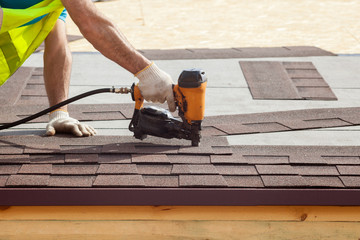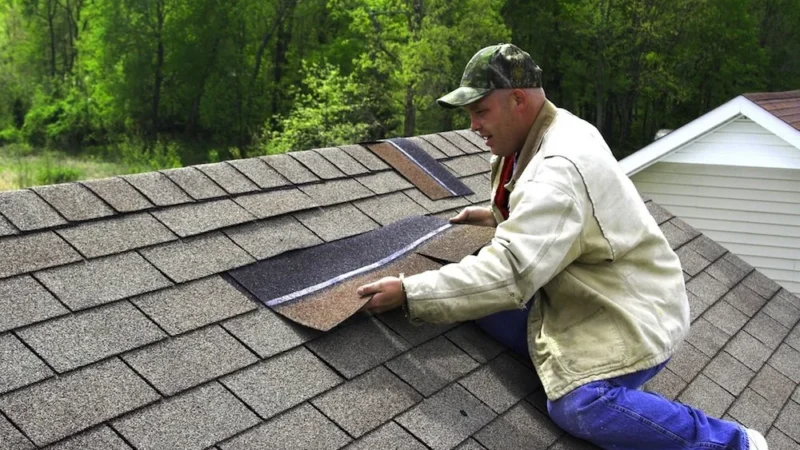Residential Roofers
A residential roof covers a home and its inhabitants, so choosing suitable roofing materials is essential. A roofing contractor can help homeowners select materials that complement the style of their homes, the local climate, and residential codes. They also know the maintenance requirements and expected lifespans of various types of roofing.

Roofers repair, install, and replace roofs for homes and buildings. They also inspect and maintain roofs to ensure they are durable, watertight, and properly insulated. They may use materials like shingles and metal sheets during construction to create the desired roof structure. Contact Roofers Baton Rouge for professional help.
Those interested in becoming roofers must undergo on-the-job training or apprenticeship to gain the necessary skills and knowledge. They learn how to read blueprints and specifications, measure roof dimensions, select and cut roofing materials, and set up scaffolding or hoists. They also learn how to handle tools, equipment, and machines used in the roofing profession.
While on the job, roofers must adhere to strict safety protocols and follow all required regulations when working on a client’s property. They also need to have good customer service skills as they will regularly be in contact with clients during the roofing process. They must answer questions and address concerns effectively to keep customers happy.
A roofer’s job is often dangerous and involves working at heights. They need to be comfortable climbing up onto rooftops, using ladders, and handling heavy roofing materials. They must also be unafraid of working outdoors in all types of weather conditions.
In addition to their roofing duties, some roofers may specialize in other areas of the roofing industry. For example, green roof installers install roofs that incorporate vegetation or other greenery to reduce energy bills and improve environmental sustainability. Others focus on repairing and maintaining flat or low-slope roofs that are common in commercial, industrial, or apartment buildings.
Roofers also often work with other trade professionals on larger building projects. They may need to collaborate with carpenters or electricians, for example, to install or repair the roofing components of an addition to a house. They also work at some manufacturing facilities, where they must navigate around machinery and production lines while completing their roofing tasks.
Roofers must be able to determine which roofing materials are best for a specific structure based on its architectural style, local climate conditions, and maintenance requirements. They must also consider the homeowner’s budget when selecting roofing materials. They sometimes provide estimates to potential clients and help them choose the most suitable roofing material for their home or business.
Education and Training Requirements
Roofers work with a wide range of materials and building styles. Depending on the type of roofing system, roofers may need to undergo specialized training and certification to install the product properly. These programs are often offered through vocational schools or through private roofing manufacturers.
Most roofers learn their trade informally, starting as helpers and gaining experience under the supervision of experienced roofers. Some roofers choose to participate in an apprenticeship program, which is typically three years long and combines a planned program of paid work experience with classroom instruction. Classroom instruction covers subjects such as safety practices, how to use and care for tools, and basic arithmetic.
Some roofers also pursue formal education to improve their skills or increase their marketability. For example, some roofers choose to take courses through the National Roofing Contractors Association (NRCA) that lead to NRCA roofing torch applicator certification. This certification is a mark of professional excellence and can enhance a job applicant’s resume.
Many states require roofers to have a state-verified roofing license before they can perform work on residential properties. These licenses vary widely by state and include both on-the-job training and coursework. Those interested in becoming roofers should check with their local government agencies for information on license requirements. In rural areas, such as Oneida County, NY, where the City of Utica is located, the local government websites are a good place to start.
In addition to a state-verified roofing license, most roofers are required to carry workers’ compensation and general liability insurance. This insurance protects homeowners in the event that a roofing worker is injured on the job site. Those seeking to hire residential roofers should always verify that the contractor they hire is insured.
Some roofers also receive specific product training to become certified to work with particular roofing products, such as shingles. Other roofers may need specialized training to operate heavy equipment, such as power tools or scaffolding. Regardless of their education or training, successful roofers are generally dependable, detail-oriented, and collective thinking individuals who have a strong desire to build long-term careers in the construction industry.
Work Environment
Roofers work in a variety of environments. On residential jobs, they typically navigate through neighborhoods and access rooftops using ladders or scaffolding. They may interact with homeowners to discuss project details and answer questions. On construction sites, they often collaborate with other construction professionals and must adhere to the schedule set by the general contractor. Roofers also sometimes work in industrial settings, such as manufacturing plants or warehouses. In these environments, they must follow strict safety protocols and may need to use specialized equipment or materials.
All roofers must regularly complete training to stay up-to-date on industry standards and to learn new skills. Some employers provide this training on-the-job, while others offer apprenticeships that combine a structured program of on-the-job experience with classroom instruction. All workers must have extensive safety training to protect themselves while working on rooftops, as falls are a common cause of workplace injury for roofers. This includes training on how to properly use ladders, as well as courses in hazard recognition and control. In addition to safety training, workers must also wear personal fall arrest systems (PFAS) whenever they are working at heights. These include harnesses or lanyards that are secured to anchor points on the structure and prevent them from falling off the roof.
Job Outlook
Roofers’ demand is not as sensitive to the economy as other construction trades because much of the work involves repairs and replacement rather than new building construction. Nevertheless, roofing contractors must keep abreast of innovations in materials and techniques to remain competitive. For example, some homeowners and commercial customers are opting for green roofs. These are covered with a special material that reflects sunlight instead of absorbing it, thereby reducing the need for air conditioning and lowering energy bills. Roofers are also called on to perform damp-proofing and waterproofing tasks on walls, swimming pools and other structures.
A high school diploma or the equivalent is required for a career as a roofer. Some vocational schools offer programs that prepare students for jobs in the roofing industry, although most roofers learn their skills on the job. Apprenticeships are available with local roofing companies and through some unions. Students who wish to enter the field may obtain information about apprenticeships through their school placement offices, the state employment service or newspaper classified ads.
The pay for a roofer varies depending on experience and geographic location. Workers who are skilled and experienced can command higher salaries. Some residential and commercial roofers are self-employed and negotiate their own wages. Roofers who are employed by a company are typically given health, dental and life insurance benefits.
Those who perform repair and maintenance work are paid hourly. They are often paid overtime if they work on weekends or during bad weather. Roofers may also be eligible for yearly performance bonuses, and may earn vacation, holiday and retirement savings plans.
The average annual wage for a roofer is $25,500, according to the Bureau of Labor Statistics. Those who are self-employed usually pay their own insurance. Workers who are part of a union may receive additional benefits such as medical and dental coverage, retirement planning and profit-sharing. Unions generally require their members to be of legal age (18) and in good physical condition. Those who wish to become roofers are advised to contact their local union office for information about apprenticeship opportunities.





